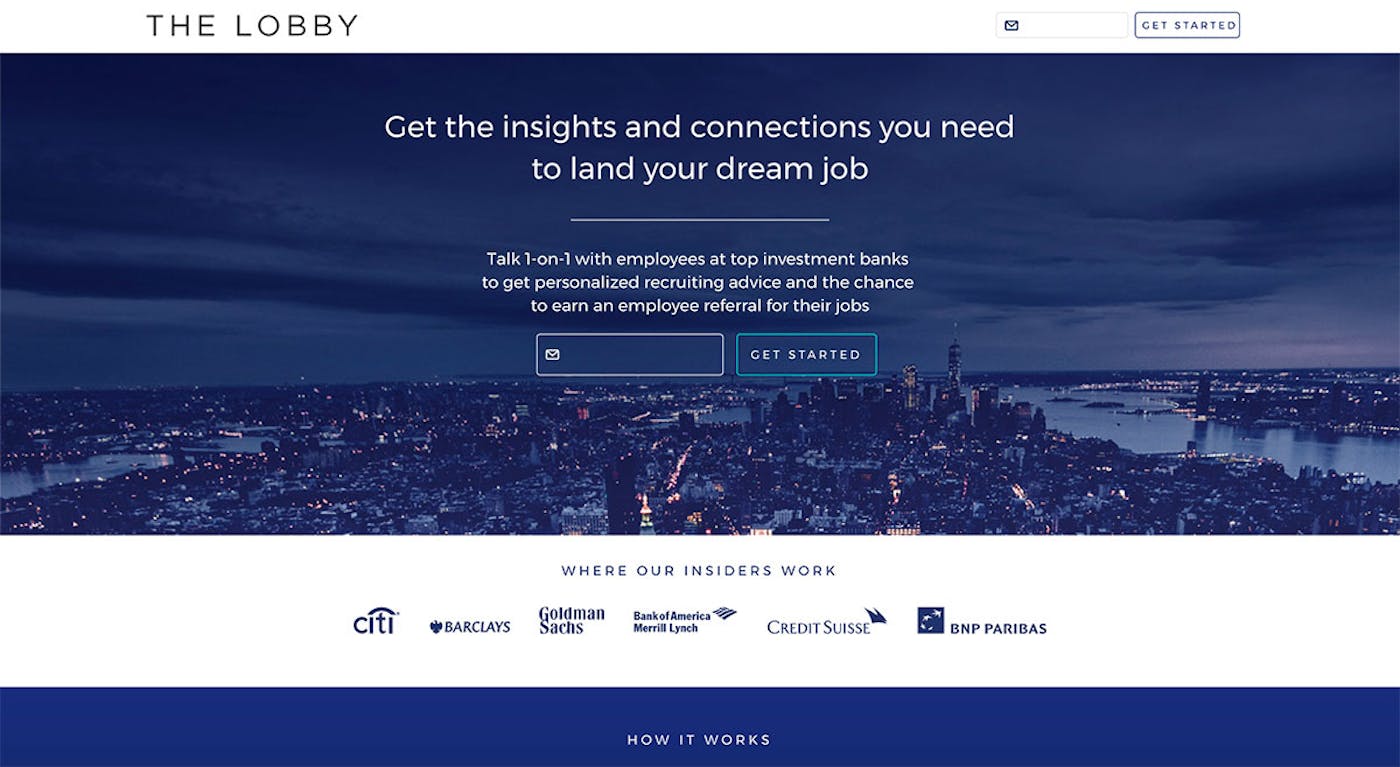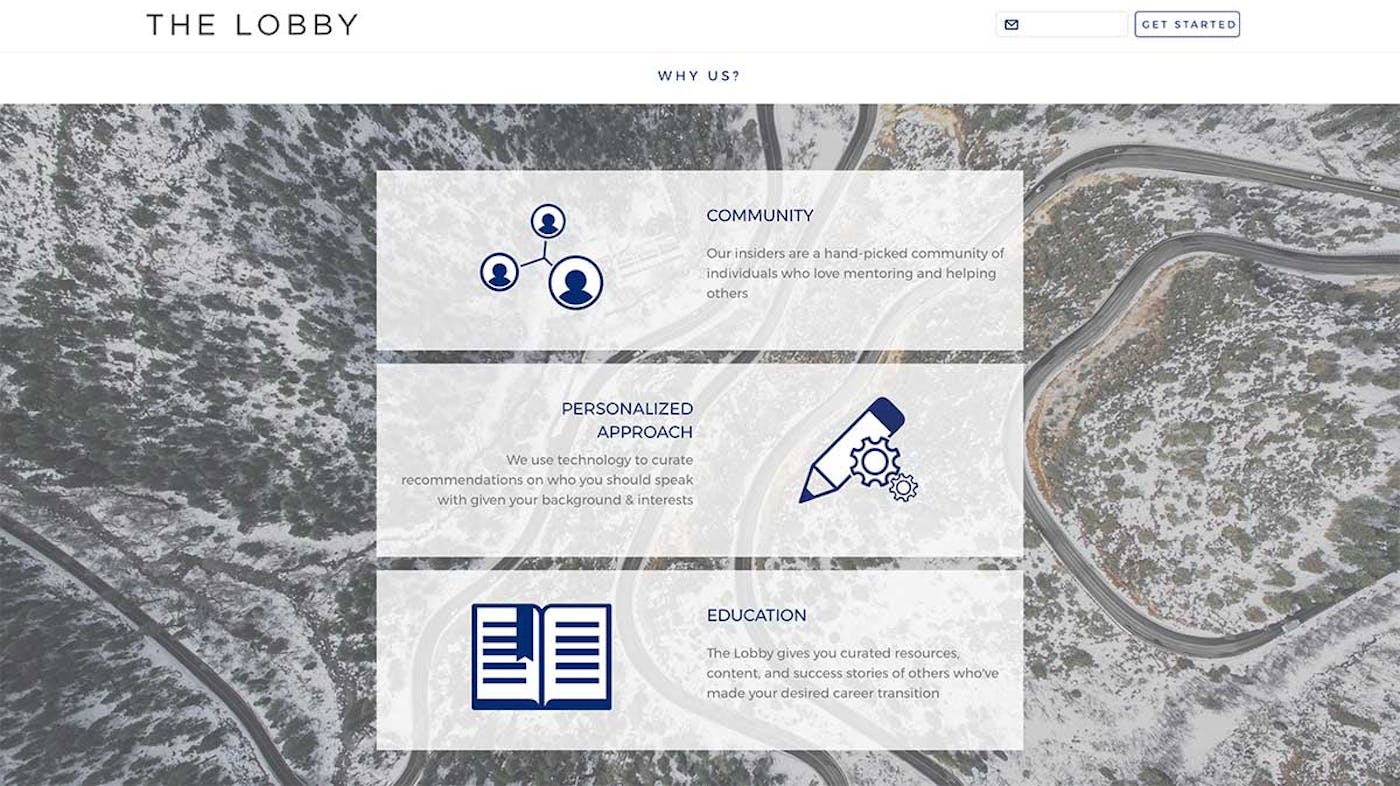Making $2,000/mo Disrupting Investment Bank
Recruiting
Hello! What's your background, and what are you working on?
Hello! I'm Deepak. I grew up in Ecuador, my parents are Indian, and I was born in Kenya! I came to the US ~7 years ago for college. Up until a year ago, most of my experience was in finance (wealth management, private equity, real estate, and investment banking).
However, I've been obsessed with starting my own business since I was a kid. To that end, I quit my last job at BofAML to take a few months off and try to start my own thing.
About a year ago, I started Legaats (a social platform where baby boomers share and document pieces of wisdom to pass on to future generations).
About 7 months in, I decided to evolve the business to what now is The Lobby. The Lobby is a marketplace where job candidates buy 1-on-1 calls with employees at top investment banks to get personalized recruiting advice and the chance to earn an employee referral.
We had a soft launch 5 weeks ago and have already sold $5k+ in calls (~$2k in revenue for us), and we're growing ~32%+ week-over-week. We have ~730 B2C sign ups and 2 B2B paying customers between our soft launch and our MVP, which started with spreadsheets and an unpaid LinkedIn status in April.
We've still spent zero dollars in marketing, and we're now partnered with over 15 schools and student clubs across northeast USA.

What motivated you to get started with The Lobby?
My school, Bentley University, is an amazing place that transformed my life in many positive ways. However, it's not what most top companies (with some notable exceptions) consider a "target school" where they'll go to recruit on campus.
The Lobby came from a problem I solved for myself, having attended Bentley and broken into wealth management at UBS, private equity real estate at a competitive boutique firm, and investment banking at BofA Merrill Lynch, without ever applying to a job online. The Lobby was also inspired from mentoring at least 40 other friends and colleagues who landed jobs at top investment banks coming from nontraditional backgrounds and schools.
This weird "non-target school kid" approach seemed to be working! After more research, my friends and I all agreed that current hiring processes for top jobs really sucked and weren't very meritocratic. It seemed the system was rigged to favor people who were born into the right circles, or those who were great "networkers", even though they might not be the best candidates for the job. That also meant companies were missing out on strong talent.
With Legaats, we ignored the MVP advice and spent way too much for a v1. That was stupid, so with The Lobby I vowed to validate the idea without spending a penny. In a nutshell, I put out a LinkedIn status telling people I was doing an "experiment" to help them get banking and consulting jobs.
Boom! 150+ emails and dozens of comments and likes. With Legaats, I'd post stuff all the time and barely get 2 likes. So something was different this time. From this response, I invented a process on the fly and started selling calls. I sold about 20 calls (to complete strangers, not friends buying pity calls) from the MVP, with a lot of repeat users, and I knew there was something there.
What went into building the initial product?
I don't know if you could call our MVP an initial product. It was just an unpaid LinkedIn status, spreadsheets, a Wix landing page, a GoToMeeting free trial, Stripe, and a Simple Invoices free trials, and a domain name on GoDaddy. That and a LOT of email and scheduling work with every potential user.
After a month or so of doing everything manually and going through Tacklebox Accelerator, we decided to build something that would let us service more users at a time. I had the good fortune of recruiting and working with an amazing group of freelancers, part-timers, and now full-timers to help get an actual v1 of a product off the ground cost-effectively. (Big thanks to Mo, Soufya, Souhail, Ismail, Ander, Obytes, Claudia, and Silvia!)

We became obsessed with doing things in a cost-effective and MVPish way, so our first launch was also still a very semi-manual product, where we only automated ~30% of the user experience. I believe we learned a lot more about every concern, bottleneck, and potential issue that our users were having on both ends of the marketplace by doing things this way.
Today, our product is close to 80-90% automated, and the scope was developed by focusing on only automating things where we were wasting a lot of time and not learning about our users (i.e. unnecessary grunt work).
How have you attracted users and grown The Lobby?
After going through Tacklebox, which focuses on customer segmentation, we concluded that we had to start with something very niche. So we chose to go with investment banking analyst and associate roles at top banks in NYC.
The choice wasn't that hard — I knew the interview processes very well, had a very strong network to source insiders (employees taking calls), and I'd been on both sides of the market (as a candidate trying to break in, and as an insider mentoring and interviewing candidates).
What has been hard has been the decision to stay focused on only these roles, when the concept is obviously applicable to many others. However, there've been repeated signs that this has been a good decision and a lot of the attraction of initial users and insiders has been very organic because of this focus.
I also tried to speak to everyone in my network who was talented at user acquisition/growth, and got specific advice for how we could find an initial user base cheaply. (Email newsletters are amazing!)
As a result, we've seen great initial traction and validation. Even though we've been growing aggressively since we started, we're now focused on taking a step back, automating steps of the user journey, and focusing on analytics. Our ultimate next step is to understand our users and build a great product in this niche before scaling.
If you had to start over, what would you do differently?
For Legaats, I would have done 500 things differently.
For The Lobby, thankfully, I feel confident that we're approaching it the right way, although we're probably making mistakes that may only become clear in hindsight a few months/years down the road. For now, we're being cost effective, have a great team, amazing advisors, and validating every major assumption we make through cheap experiments.
Have you found anything particularly helpful or advantageous?
I think the most underrated source of help I've gotten is other startup founders. By helping them out with little things like intros, reviewing their deck, etc., they reciprocate on incredible levels because they know what the grind is like. Networks for entrepreneurs can also be incredibly helpful in finding teammates, resources, and mentorship. I'm a part of Kairos Society and Next Gen Summit. Both have resulted in tons of benefits and new friendships.
Coming from a completely nontechnical background, it's also been great to do online/offline courses such as product management (General Assembly), front-end web development (Bloc), and just read a ton of tech-related founder stories. I think the best resource for me has been Y Combinator's How To Start a Startup videos. I still rewatch some of those videos from time to time.
Where can we go to learn more?
Check out The Lobby and please send it to any friends trying to break into investment banking! We also have a YouTube channel for events we've hosted, with speakers such as the co-founder of Classpass, co-founder and CEO of Trigger, and head of growth at Velocity.
I occasionally write on Medium and answer IB-related questions on Quora.
Feel free to reach out at [email protected]! Thanks for having me!

@deepakchhugani I wish this was in the UK
Hey coolbit108! We're laser focused on investment banking analyst & associate roles; most of those are in NYC, but we have a ton in London. If you're interested just sign up at www.thelobby.io or reach out at [email protected]!
looks v cool - question though; what do the bankers get out of it? Was it hard to recruit bankers for it?
Hey Pete! Thanks for the kind words. We thought it was kind of clear since we said $5k in calls but $2k in revenue. The delta was paid out to the bankers as well as Stripe fees. It wasn’t hard because my network of bankers was/is very strong!
Great Job Deepak! I'm wondering how was the state of your linkedin profile back then? Does it have a lot of followers/connection?
Hey rendytan! Thanks for the kind words. I prob had close to 1,300-1,400 connections, but it was very organic because most of my network were people who came from business-focused backgrounds. I have never been deliberate about having a large LinkedIn connection network. In this case, it proved useful!
Cool concept Deepak. Shows that a deeper dive into something niche is often more useful in the market than something more generic.
My favorite part of these fantastic interviews is always the business model question, as it tends to tie in many of the other lessons-learned. This is the first time I've seen an interview without it. Were you not willing to disclose that to the audience? If so, may I ask why not?
Hey Scott! Thanks for the kind words - much appreciated. We believe a deep dive is the right way to go as well. We thought it was kind of clear since we said $5k in calls but $2k in revenue. The delta was paid out to the bankers as well as Stripe fees.
Hey Matias! We thought it was kind of clear since we said $5k in calls but $2k in revenue. The delta was paid out to the bankers as well as Stripe fees.
Yes, I like to know more about this too. How much is service costing and what is split with "insiders"?
This comment was deleted 7 years ago